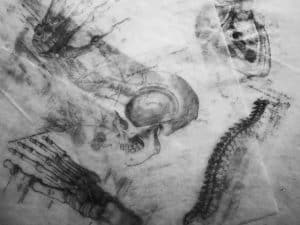~1823 words, approx 12 minutes reading time
Stop me if you’ve heard this one.
Let’s say here’s a woman, who rides out into the desert, into the red, dead badlands with nothing to her name but the weight of that name. Nothing on her back but the weight of her bones. And nothing on her hip but a revolver, a sloping grey thing the size of a toddler, propped on her hip like it was her own child.
Say she’s been hurt, this woman. Say she’s been hard-up and hard-used, and weren’t none of it even a little bit fair. Say she lit out one night, under a sky like a hole, yawning black and empty like an open grave. Let’s say in this country of this woman, grief—cold, angry grief—is a kind of a horse, flea-bitten and high-hocked. Let’s say that’s the same everywhere, ain’t it, that sometimes all you have to carry you forward is the sting of that grief.
Say she stopped, slid from her horse (roan, and soft-nosed, and breathing harder than it is kind for a creature to have to breathe), and say she stood and bared her teeth into the wind and howled when the wind howled. Let’s say everything this woman ever held to her heart was buried in the ground behind her, in a country called the Past. They do things different there.
Let’s say this woman—let’s call her Tully—let’s say she slaps the dirt from her thighs with an old leather hat, and hunkers down to set about making herself a fire. She knows the burn in her throat can burn but it won’t keep her warm. She knows that way out, on the edge of everything, where the ground cracks open marrow-red into the bones of the world, there’s Justice. They say there is, so there must be.
Tully broods by her fire, squinting into the dark.
The next day, she swaps the gun for a shovel, in a town called Can’t-Take-It-With-You.
#
Tully rides, and her thighs blister. The blisters break. She sleeps. She waters the horse from her own canteen; for herself, Tully presses her face to the walls of slot-canyons, and licks at the hard, dusty water weeping from the rock. Tully goes hungry, Tully tightens her belt, Tully does as needs must—gnaws pemmican and holds up the odd stagecoach, a train.
Tully knows, like you may know, what they say about the Redlands—way out the ass-end of everything with the great, broken-toothed skull of the mountains curving away in the far distance, and the cracked marrow-red of the rocky ground slowly baking and bleaching in the sun, and the sky staring at you, blind, milky, cataract-blue, blue like a dead eye filmed over—in a place like that, surely there must be some Justice to be found.
They say the Redlands are a cold comfort, a mean, desert-cold, where all the great and grand truths of the world are to be found, hiding in a hole in the ground, because you’d put ‘em somewhere safe, wouldn’t you? God, locking up his papers in the safe of the red-rock bluffs, all the Mercy and the Grace and the Justice that you never see in the day-to-day, because you’d have to earn them.
This is Tully’s last and secret catechism: that the hardness matters. That Justice can be found, if you just hurt enough.
Because Tully has hurt. And wouldn’t a place like the Redlands, which is nothing but, have to be hiding something good in a hard, red place? Wouldn’t Justice live where the Dead don’t, the last and the only thing any of them were looking for? Wouldn’t it just have to be true? Wouldn’t it just have to be, before everything stopped meaning anything at all?
You know?
#
God, it just ain’t fair.
Tully digs. Comes up empty.
Tully’s hands get raw, then wet, then hard.
She is not who she was, probably. Probably not anymore.
She can barely even remember all the reasons why she’s doing what she’s doing, just that she has to, just that she can’t not, just there has to be some way to get right.
Sometimes she throws the shovel down, and howls and howls, until her throat cracks, howls until her lungs burst to ribbons, and sometimes that helps.
Mostly it just makes her feel six kinds of stupid.
The digging hurts, but it’s a better hurt, so Tully tries, as best she can, to swallow her screams.
It tastes like nothing, nothing at all.
#
So Tully ain’t the first to light out looking for something to make it alright, to make it make sense. Ain’t the first to swap a gun for a shovel and go out into the red, dead badlands, trying to dig up some truth to it all. But Tully’s the first to find her.
#
Let’s say Tully rides so long and so hard her horse comes up lame.
Let’s not say that.
It’s too sad, poor thing didn’t do nothing to deserve that, and the horse, at least, can be afforded a little grace.
Let’s say Tully rides so hard and so long, she drops from the saddle like a stone. Say she hits the hard, red ground, say the insides of her eyelids fizz with hard, red stars before they go black.
Say she wakes up when a hard, red woman nudges her temple with one bootheel, and says, “The hell you lookin for out here, then?”
Say Tully croaks “Justice,” through the swaddling haze of a concussion and lips cracked to bleeding.
And let’s say the woman laughs, a vulturine, tobacco-y rasp of a laugh, and spits into the dirt, and says, “Well, lucky you. You found her.”
#
Justice (Montclaire, from a good family back East, ‘cause she’d have to be, wouldn’t she? Wouldn’t she just.) has a narrow, rabbity jaw, and a downy blood-buzz of hair, barely more than a rusty shadow on her scalp, and eyes like a mad prophet, which is to say no eyes at all. Instead, two chunks of roseate feldspar wink in her wind-burnt face, flinty and pink as a winter dawn.
Let’s say that in the country of Justice Montclaire, they say that it takes hard eyes to see a hard truth, and a hard tongue to say it, and they can teach you the second and give you the first. In her country, the thing that carries you forward is a duty, which is a kind of a horse, long-faced and high-strung, a chestnut gelding with one white sock.
Tully’s been up for an hour or two, plying her shovel, fat fishtail braid glued to the back of her neck, while Justice and the bay both whistle through their teeth.
“Ain’t gonna find what you’re after,” Justice hums, narrowing her rosy granite eyes under her hat.
Tully huffs. “And I suppose you’d know.”
“Sure would. You ain’t the first one to come out this way.”
Tully stabs her shovel into fleshy red earth, braces heavily on the handle.
Tully says:“Okay, then what’s here?”
Justice spreads her hands. She slouches, leans way, way back in the saddle, and stretches out her empty palms, perfectly balanced. There is an awful pink light behind her stony eyes, shining through them like marble scraped thin.
“This is just the Redlands. There ain’t nothing out here but dirt and blood. All I have to tell you is the thing you don’t wanna hear. The ones you loved who let you down could only carry so much, and they weren’t wrong. The ones who hurt you sleep free and easy, and when their heads hit the pillow, they don’t even think about you at all, not even a little, and you will never make them understand or regret what they did. There’s no Justice out here. What you want ain’t Justice, anyway, because Justice, real Justice is bigger than you, and me, and this place, and it don’t stop with just hurting them back.”
Tully narrows her eyes right back. Tully sets her jaw like shovel-blade to the edge of a grave.
“Could start there.”
Justice laughs. It is neither a friendly nor a companionable sound.
“Sure could,” she allows, “Sure could. But you’d never stop. You’d hafta change the shape of the whole world for that.” Justice snorts, “With your fuckin’ shovel.”
Her stony eyes slip shut.
“Could never do it all alone.”
#
Truth lives in a hole in the ground, like a diamond, or diamond-back, just as hard and twice as mean. This is a thing they say in Tully’s country, and that Truth brings Justice, and if Tully can just find the one thing, the one white-fanged glittering nugget of the Truth that would prove that all the hurt happened, and it was real, and it meant something, then everything would come right. They’d be sorry.
She could make them sorry. If she could just find it.
In her secret heart, Tully is chewed down to the bone, and nursing a hate that it fell to her at all to prove anything.
Tully nurses this hate like a baby.
Justice Montclaire thinks the baby has Tully’s eyes.
#
Let’s say Justice Montclaire was a Justice of the Peace back home. Let’s say Tully was nobody. Let’s say Justice had an accountant for a daddy, let’s say she learned to settle up accounts before she even knew what settling was. Let’s say there’s one fire, and the horse-blankets are thin, and the desert is cold at night, and let’s say that Justice holds Tully to her like a scream you can’t let out. Justice has a hard mouth like a bullet that can only say things you didn’t really want to hear, and let’s say Tully buries her face in Justice’s neck and whispers “it’s not fair,” and let’s say Justice licks hard, salty tear-tracks from Tully’s face like the walls of a slot-canyon, and says, “I know. I know. It never is.”
#
In the mornings, Tully digs and Justice watches, and when it gets too hot to dig, the two of them fish in a muddy trickle of arroyo that oughta be ashamed to call itself anything more than a stream. At night they sit by one fire, sucking on fish bones that taste clean and cold and like swallowing screams because there’s nowhere to put them. Their ankles knock together. Sometimes Tully stares too long at the firelight thrown up against the rocky crag of Justice Montclaire’s awful eyes.
“What do you see out of those?”
“Bits,” Justice says, “Pieces. Shapes of things. Mostly things folks don’t want seen.”
#
Let’s say there is no Justice in the Redlands.
Let’s say there is no Tully.
Let’s say they saddled up, two women on two horses, which are grief and hurt and duty, with a shovel, which is good for laying foundations, and a thing between them they cannot name.
Let’s hope they make it.
Jay Harper is an itinerant prophet of the Wastelands, and a graduate of U.C. Davis with a degree in Linguistics and Cultural Anthropology. They currently live in Chicago with their girlfriend, and the skulls of several small mammals. This is their first publication.
Photo by Paolo Chiabrando on Unsplash
Creator Spotlight:
Jay Harper
Author of “Redlands”
What inspired you to write this story?
This story touches on a feeling that has come up for me during some really difficult times in my life, when all I wanted was some kind of admission of guilt, or all I wanted was not even for somebody to tell me that they were sorry, just to admit wrongdoing, and it was the hardest thing in the world for me to figure out a way to move beyond the fact that I was never going to get that. In many ways I do still struggle with that, and I think the story is also end it expression of the tension that can exist between justice as an ideal, and what would seem fair to you, what you personally would need to get some kind of emotional closure on the things that of happened to you.
What do you hope readers take from this story?
I would hope that people take away the idea that while the work of trying to establish a more just world is often really hard, and frequently infuriating, and feels deeply unfair, that it is nevertheless worth trying to do.
To give other writers hope, would you mind sharing with us how many edits and/or submissions this story has been through?
A very dear friend of mine helped me edit this piece prior to submitting, and it went through probably a good three rounds of edits from first draft to the time that I submitted it, but this is actually my first time submitting anything anywhere. So…take a shot in the dark y’all, you never know!
Recommend something to us! This could be a book, a short story, a video game, a project you’ve heard about, something you’re working on, etc. Anything that has you excited and that you want people to know about.
I am super excited for Star Eater, and The Chosen and the Beautiful (Cannibal priestesses, and a Great Gatsbyretelling starring a Vietnamese Jordan Baker, who is gay and does magic, respectively), but honestly, the number one thing that has been getting me through my week, and indeed, reminding me that weeks are still a thing that exist, are art streams that my friend Alex does. They stream art on Twitch (https://twitch.tv/bythehalfpint/) with a weekly robot session and a choose-your-own adventurer session, where the audience gets to decide what a character looks like, which has produced everything from cybergoth nun barbarians, to an opossum trash warlock, and it is so much fun! I keep myself anchored to the concept of linear time by tuning into these streams.






